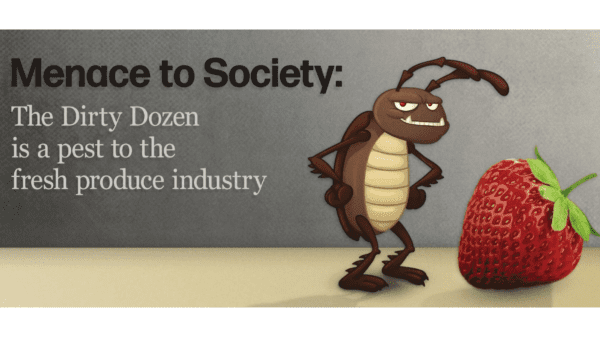
American consumers’ produce consumption levels play a part in the pesticide residue debate.
An article on produce safety in the October 2020 issue of Consumer Reports features a produce safety guide created by “CR’s experts,” which breaks down produce commodities according to how many servings you can safely eat per day.
In the category of conventionally grown items, broccoli, cabbage, carrots, fresh onions, peas, and scallions fare pretty well: you can safely eat 10 servings of these per day. Not so for green beans, fresh spinach, or peaches, of which you can safely eat only one to two servings per day.
But who is eating produce in these quantities?
A recent study from the Centers for Disease Control and Prevention surveyed Americans about their food habits. In Vermont, the most virtuous state in this regard, 32 percent of the population reported eating less than one serving of fruit per day, while 32.7 percent ate less than one serving of vegetables (French fries count, by the way).
Oklahoma fared the worst: 48.4 percent of adults ate less than one serving of fruit per day, and 21.5 percent ate less than one serving of vegetables.
It is very difficult to look at the consumption habits of the U.S. population and conclude that the ingestion of toxic pesticides from fruits and vegetables is anything more than the most minimal concern—especially in the face of other public health problems, such as obesity.
Ironically, someone who did eat fruits and vegetables to an extent that would cause pesticide health concerns would have a much healthier diet than the typical American.
“Using myself as an example,” says Christine Rosenbloom, nutrition professor emerita at Georgia State University, points out, “I could eat 850 apples or 13,225 servings of blueberries in 1 day without any effect, even under the worst-case scenario of the fruit having the highest pesticide residue recorded by the USDA.”
This an excerpt from the cover story in the May/June 2022 issue of Produce Blueprints Magazine. Click here to read the whole issue.
American consumers’ produce consumption levels play a part in the pesticide residue debate.
An article on produce safety in the October 2020 issue of Consumer Reports features a produce safety guide created by “CR’s experts,” which breaks down produce commodities according to how many servings you can safely eat per day.
In the category of conventionally grown items, broccoli, cabbage, carrots, fresh onions, peas, and scallions fare pretty well: you can safely eat 10 servings of these per day. Not so for green beans, fresh spinach, or peaches, of which you can safely eat only one to two servings per day.
But who is eating produce in these quantities?
A recent study from the Centers for Disease Control and Prevention surveyed Americans about their food habits. In Vermont, the most virtuous state in this regard, 32 percent of the population reported eating less than one serving of fruit per day, while 32.7 percent ate less than one serving of vegetables (French fries count, by the way).
Oklahoma fared the worst: 48.4 percent of adults ate less than one serving of fruit per day, and 21.5 percent ate less than one serving of vegetables.
It is very difficult to look at the consumption habits of the U.S. population and conclude that the ingestion of toxic pesticides from fruits and vegetables is anything more than the most minimal concern—especially in the face of other public health problems, such as obesity.
Ironically, someone who did eat fruits and vegetables to an extent that would cause pesticide health concerns would have a much healthier diet than the typical American.
“Using myself as an example,” says Christine Rosenbloom, nutrition professor emerita at Georgia State University, points out, “I could eat 850 apples or 13,225 servings of blueberries in 1 day without any effect, even under the worst-case scenario of the fruit having the highest pesticide residue recorded by the USDA.”
This an excerpt from the cover story in the May/June 2022 issue of Produce Blueprints Magazine. Click here to read the whole issue.
Richard Smoley, contributing editor for Blue Book Services, Inc., has more than 40 years of experience in magazine writing and editing, and is the former managing editor of California Farmer magazine. A graduate of Harvard and Oxford universities, he has published 12 books.



